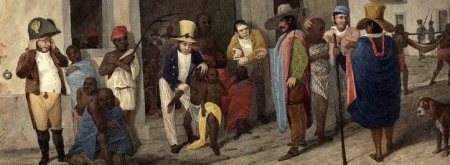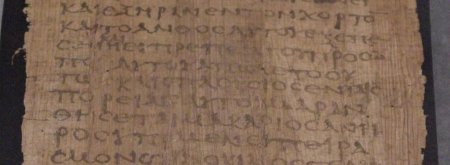Does the Bible Support Slavery?
This lecture responds to the accusation that the Bible actively supports slavery. Peter J. Williams examines the issue by explaining how biblical words connected with slavery in the Old and New Testament texts have been translated and how contemporary understandings of these words have changed over the years.
The lecture is about one hour long, followed by 15 minutes of questions and answers.
Brief notes from the lecture
Is there a distinction between slavery and forced labour in certain circumstances, eg. making people who are in prison work?
Thesis of the talk: when we consider historical definitions of slavery it is clear that the Bible does not support that kind of slavery.
Sam Harris talks of slavery and the Bible in Letter to a Christian Nation, calling it "an abomination", quoting Leviticus 25:44-46 (RSV).
The issue we face as Christians can be set out as follows:
- Bible translations do talk of slaves.
- The Old Testament gives no objection to having slaves.
- The New Testament does not command the release of slaves, and slaves are told to submit.
- Therefore, biblical texts approve of slavery.
- We know that slavery is wrong.
- Therefore, biblical texts approve of something that is wrong.
The talk is in four parts: 1. Translation of the term slave; 2. Examination of what the Old Testament says on the subject; 3. A re-examination of the account of the Exodus; 4. Examination of what the New Testament says on the subject.
1. Translation of the Term 'Slave'
Need to know one Hebrew word: ‘ebed (also transliterated as ‘eved). It is commonly translated 'slave'.
The King James Version of the Bible had two occurrences of the word slave: once in each Testament. The New King James Version in the twentieth century had 46 occurences. There has been a general increase over time in the use of the word 'slave' in translations of the Bible into various languages.
‘ebed is translated as 'slave' in some cases and 'servant' in others. Leviticus 25:42 in the English RSV translation has slave once and servant once, but both translate the same word ‘ebed.
'Servant' and 'slave' used to overlap much more in meaning, but now have different meanings. Servants are no longer seen as slaves.
The meaning of the word ‘ebed is not inherently negative, but relates to work. The word identifies someone as dependent on someone else with whom they stand in some sort of relation. Being an ‘ebed could be a position of honour. Everyone is a servant / slave of someone else.
The majority meaning of ‘ebed is 'servant', but can also be translated 'slave'. It is not an inherently negative term, and is related to work. The term shows the person is subservient to another. All subjects of Israel are servants of the king. The king himself is a servant of their God. So in the time of the Old Testament, no-one is free – everyone is subservient to, an ‘ebed of, someone else.
Translating ‘ebed as 'slave' is problematic because of its negative connotations, which were not originally there but we associate from other historical contexts. This generally leads to inconsistency in translation and it becomes hard for readers not to read into the word ideas from subsequent, very different systems of slavery (eg. in Greece, Rome and North America).
2. The Essence of the Old Testament Institution
In the patriarchal system, the work in someone's household was carried out by herdsmen and domestic servants, but if Abraham had had no offspring one of his servants would inherit all he had (Genesis 15:3). Servants were trusted with money and weapons. There is no approval for selling people, although Abraham 'acquired' people for silver.
The following table shows a comparison of slave systems.
| Old Testament | Roman |
New World |
|
| Holiday | Yes | No | Yes |
| Enough food | Yes | No | No |
| Legal redress | Yes | No | No |
| Sexual protection | Yes | No | No |
| Kidnapped | No | Yes | Yes |
| Chains | No | Yes | Yes |
| Torture | No | Yes | Yes |
| Physical abuse | No | Yes | Yes |
Deuteronomy 23:15-16 forbids returning a runaway slave to his master. This contrasts to former slavery laws in America or even in the ancient lawcode of the Babylonian king Hammurabi (law 17).
Does Exodus 21 treat slaves as chattels?
Exodus 21:18-27 contains laws on how to treat slaves. Verses 18-19 deal with guidance in cases of injury. Verses 26-27 give the consequences of injuring slaves. Verse 21 seems to suggest that the slave is a possession: "for the slave is his money" (ESV). This does not indicate that the master owns the slave and can do what he likes, as the rest of the Old Testament shows that that is clearly not the case, but the "for" indicates the reason that the slave is not to be avenged: it is because the slave is the master's "money" (literally "silver"). In other words, because the master benefits from the slave being alive, it is to be presumed that when he struck the slave, he did not intend to kill the slave. The consequences of striking and injuring a slave are given in verses 26-27.
Property, ownership and sale
In Hebrew, the term for selling and for buying are not distinguished from acquiring without money, so often these words in the context of slavery are about debt slavery or servitude, people "selling" themselves or a daughter in return for something when they have no other economic resources to survive. It is a pledge of future work, temporarily, for a meal today. The selling of a daughter is also related to marriage and dowries.
In interpreting the Old Testament, it is often helpful to go back first to what Creation teaches rather than to start with what the Law stipulates (as Jesus did in relation to questions about divorce). Often the Old Testament Law is a matter of permitting or regulating something, rather than saying that it is good.
3. The Exodus
The Exodus of the people of Israel from Egypt is not so much about God setting the Israelites free (eg. as suggested by Deuteronomy 6:21). Exodus does not say that the Israelites were slaves (‘ebed) in Egypt, although it is clear from the text that it was very much like slavery as we normally understand it (see Exodus 1:10-14). But they were brought out of Egypt in order to "serve God" (also translated as "worship God") – the word is from the same root as ‘ebed.
In the account of the Exodus, the word ‘ebed is used 3 times of the Israelites (in one passage, Exodus 5:15-16), but is used more than 20 times of the Egyptian people serving, or being slaves to, Pharaoh.
The Israelites are to serve God – they are servants / slaves belonging to him (see John 8:33).
4. The New Testament Teaching on Slavery
Christians could not change the legal system. A slave rebellion would have led to the execution of the rebels. There were also legal restrictions concerning the number of slaves who could be freed and freeing them early (before the age of 30) could bar them from becoming Roman citizens (Lex Fufia Caninia and Lex Aelia Sentia).
Commanding Christians to free their slaves would not therefore have been legal, nor would it have worked as, by state law, some of those slaves would still not have been free. But Christians were commanded to love others as Christ loved us. That meant that people could no longer be treated as slaves, but Christians would then become the servants of all, as Christ was (Philippians 2:7).
In their letters, Paul and Peter mention Christians exchanging a holy kiss. For the general culture, a kiss was a greeting for family only. It was not how people generally greeted each other. The runaway slave Philemon is received back "above a slave" (Philemon 16). Jesus is called Lord because he is their Master and so no-one else could claim to be someone's master.
Although Christians could not abolish Roman slavery, they started a new form of society, a new 'race', within the Roman Empire in which they lived, and this effectively challenged the status of human beings either as masters or as slaves to other human beings.
This lecture was given at the Lanier Theological Library on 30th October 2015. A Scholars' Conference on the same topic, including a panel discussion with Peter Williams, was held earlier in the day. This covers many of the same themes and can be accessed here.
© 2015 Peter J. Williams



